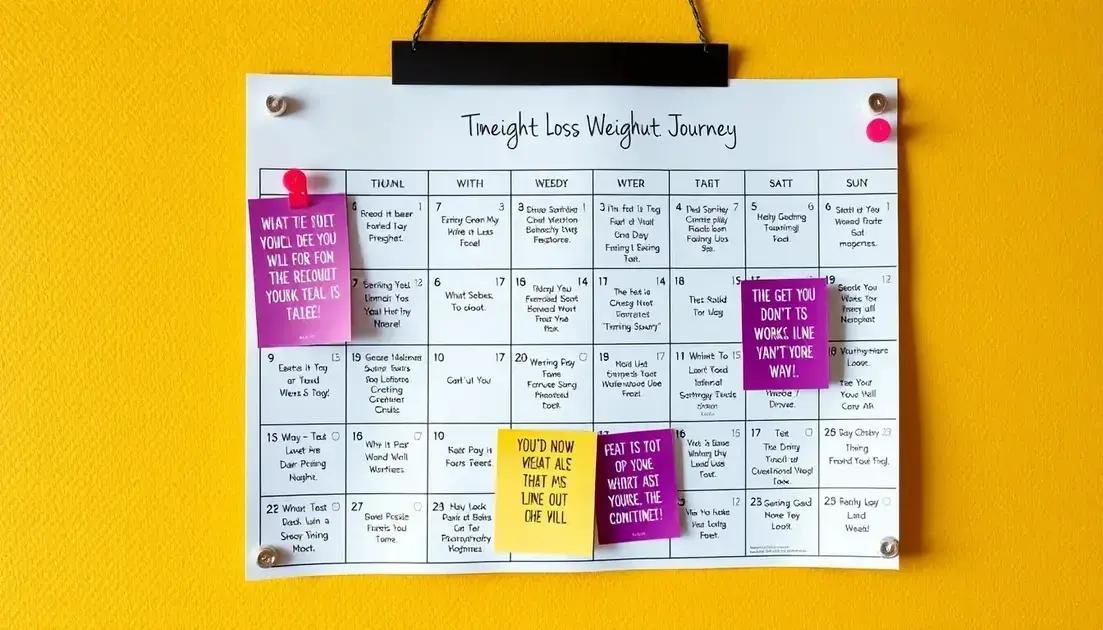
Unlocking Weight Loss: Top 10 Expert Answers to Your Burning Questions
-
Maria Duarte
-
20, janeiro, 2025
Topics
 Shared
Shared
When it comes to shedding those extra pounds, there are countless questions that arise.
Our comprehensive guide based on the Top 10 FAQs About Losing Weight dives deep into expert insights, tackling common myths, diet plans, and the critical roles sleep, stress, and exercise play in weight management.
Whether you’re curious about safe weight loss goals or the effectiveness of supplements, we’ve got you covered.
Let’s explore your journey towards a healthier you, supported by scientific evidence and expert advice.
What are the common myths about losing weight?
Common Myths: Losing weight doesn’t mean starving yourself; healthy eating is key. Not all carbohydrates are bad; whole grains and fruits can be beneficial. Skipping meals can lead to overeating later. You don’t need to exercise for hours; moderation in exercise is often more effective.
Safe Weight Loss: Experts suggest losing 1-2 pounds per week for sustainability while maintaining muscle mass. Rapid weight loss can lead to health issues, so gradual changes through diet and exercise are recommended.
Best Diet: The best diet is individual-specific but generally includes fruits, vegetables, lean proteins, and whole grains. Low-carb or Mediterranean diets can also be effective, depending on personal preference.
Exercise Importance:
While diet is crucial, exercise enhances the weight loss process, helps burn calories, and boosts metabolism. Even moderate activities like walking are beneficial. Combining diet and exercise is ideal for overall health.
Sleep Effects: Adequate sleep is vital for weight loss. Lack of sleep can disrupt hormones regulating appetite, leading to cravings and overeating. Aim for 7-9 hours of quality sleep nightly.
Stress Influence: Yes, stress impacts weight, often leading to emotional eating and unhealthy choices. Chronic stress may cause hormonal changes that promote fat storage, particularly in the abdomen.
Supplement Effectiveness: Some weight loss supplements claim benefits, but results vary and many lack scientific evidence. Consulting with a healthcare professional before starting any supplement is recommended; a healthy diet and exercise are more effective.
Setting Goals: Realistic goals should be specific, measurable, and attainable. Rather than losing 30 pounds in a month, target 5 pounds over four weeks, celebrating small achievements to stay motivated.
Water Aid: Drinking water can assist with weight loss by keeping you hydrated and reducing hunger. Studies indicate drinking water before meals can decrease calorie intake. Replacing sugary drinks with water is beneficial.
Metabolism Role: Metabolism is how the body converts food into energy. A higher metabolic rate burns more calories, aiding weight loss. Factors like age and muscle mass affect metabolism; strength training can enhance it.
Meal Timing: Meal timing can influence hunger and energy. Regular meals help prevent excessive hunger and unhealthy snacking. Some may succeed with intermittent fasting, but it’s not necessary for everyone.
Favorite Foods: You can still lose weight while enjoying favorite foods by moderating portions. Allowing occasional treats can prevent feelings of deprivation and aid adherence to a healthy eating plan.
How much weight can you lose in a week safely?

When considering weight loss, it is essential to approach it safely.
Experts generally agree that aiming to lose 1 to 2 pounds per week is a healthy and sustainable goal. This gradual approach helps maintain muscle while shedding fat.
Rapid weight loss often leads to muscle loss and is difficult to maintain.
It’s important to create a calorie deficit through a balanced diet and regular exercise.
Remember, consistency is key to achieving long-term results without compromising your health.
What is the best diet for weight loss?
When it comes to the best diet for weight loss, it varies for each individual based on their preferences and nutritional needs.
Generally, a healthy diet should include a variety of fruits, vegetables, lean proteins, and whole grains.
Some popular options are the Mediterranean diet, which emphasizes healthy fats and lean proteins, and low-carbohydrate diets, which focus on reducing sugar intake.
Each diet has its pros and cons, but the key is to find one that you can stick to long-term.
Focus on portion control, and try to avoid highly processed foods.
Consulting a nutritionist can also help tailor a diet plan that suits your lifestyle and goals.
Is exercise necessary for weight loss?

Exercise is an important part of any weight loss plan, but it is not the only factor. While caloric intake is crucial, incorporating physical activity helps burn calories and improve overall health.
Regular exercise not only aids in weight reduction but also builds muscle, which can increase your metabolism.
Even short durations of exercise can be beneficial. Activities like walking, cycling, or swimming promote fat loss and enhance cardiovascular health. Finding a fun and enjoyable exercise can make it easier to stick with it long-term.
Ultimately, combining a healthy diet with regular exercise is the best approach for sustainable weight loss. Aim for at least 150 minutes of moderate aerobic activity each week for optimal results.
How does sleep affect weight loss?
Sleep plays a vital role in weight loss and overall health. Lack of adequate sleep can disrupt hormones that control appetite, leading to increased hunger and cravings.
In particular, decreased sleep elevates the hormone ghrelin, which stimulates appetite, and reduces leptin, the hormone that signals fullness.
Additionally, poor sleep can affect your metabolism, making it harder to burn calories efficiently. Studies show that insufficient sleep is linked to an increased risk of obesity, as it can lead to poor dietary choices and reduced physical activity.
To support weight loss, aim for 7-9 hours of quality sleep each night. Establishing a regular sleep schedule and creating a relaxing bedtime routine can improve sleep quality, thus helping to maintain a healthy weight.
Can stress influence body weight?

Yes, stress can significantly influence body weight. When individuals experience high stress levels, the body produces cortisol, a hormone that can lead to increased appetite and cravings for unhealthy foods. This often results in emotional eating, where people turn to food for comfort.
Moreover, stress can impact lifestyle choices, leading to reduced physical activity and poor diet. Chronic stress may contribute to fat accumulation, particularly around the abdomen.
Managing stress through activities like exercise, meditation, or spending time with loved ones can help mitigate its effects on weight. Maintaining a balanced lifestyle is essential for both mental and physical health.
Are weight loss supplements effective?
Weight loss supplements can be tempting for those looking to shed pounds quickly. However, their effectiveness varies widely. Some supplements may help, but many lack scientific support. It’s important to understand that most supplements are not a substitute for healthy eating and regular exercise.
Common ingredients include caffeine, which may boost metabolism, and fiber, which can promote satiety. However, relying solely on supplements often leads to disappointment. Additionally, some can have side effects or interact with medications.
A balanced diet and lifestyle changes are crucial for sustainable weight loss. Consulting a healthcare professional before starting any supplement is recommended to ensure safety and effectiveness.
How to set realistic weight loss goals?

Setting realistic weight loss goals is crucial for success. It’s essential to create SMART goals, which are Specific, Measurable, Achievable, Relevant, and Time-bound. Instead of aiming to lose 30 pounds in a month, start with small milestones like losing 1-2 pounds per week.
Tracking progress through a journal can help keep you motivated.
Consider factors impacting your weight loss, such as diet, exercise, and lifestyle habits. Make sure your goals align with your overall health and not just a number on the scale. Celebrate your achievements, no matter how small, to encourage a positive relationship with your journey.
Does drinking water aid in losing weight?
Benefits of Drinking Water for Weight Loss:
1. Increases feelings of fullness before meals.
2. Contains no calories, making it a great substitute for sugary drinks.
3. Temporarily boosts metabolism.
4. Decreases daily caloric intake.
5. Supports effective digestion and nutrient absorption.
Recommendation:
Aim to drink enough water throughout the day to support weight loss efforts.
What role does metabolism play in weight loss?

Metabolism is the process by which your body converts what you eat and drink into energy. This energy is fundamental for every function in the body, including breathing, circulating blood, and cell growth. A higher metabolic rate means your body burns more calories, which can assist in weight loss.
Several factors influence metabolism, such as age, muscle mass, and sex. Generally, individuals with more muscle burn more calories at rest. Regular exercise, particularly strength training, can help boost your metabolism by increasing muscle mass.
Foods and Drinks that Influence Metabolism
Additionally, certain foods and drinks, like green tea and protein-rich foods, may temporarily increase metabolic rate. It’s important to combine these insights with a healthy eating plan and regular physical activity to achieve effective weight management.
How important is meal timing in losing weight?
Meal timing can play a significant role in weight loss. Eating regularly throughout the day helps keep your metabolism active and maintains balanced energy levels. Spacing out meals and snacks every 3-4 hours can prevent excessive hunger and unhealthy snacking.
Additionally, some research suggests that eating earlier in the day might be beneficial for weight management. Skipping breakfast or eating late at night can lead to weight gain, as late meals are often less nutritious and more calorie-dense.
Listening to your body’s hunger cues is essential; aim to eat when you’re genuinely hungry rather than out of habit. Finding a meal schedule that fits your lifestyle and keeps your energy stable is a key component of successful weight loss.
Can you lose weight without giving up favorite foods?

You can absolutely lose weight without giving up your favorite foods. The key is moderation and balance. Instead of eliminating treats entirely, consider adjusting portion sizes or frequency. For example, if you love ice cream, enjoy a small serving instead of a large bowl.
Incorporating your favorite foods into a healthy diet can prevent feelings of deprivation, which often lead to binge eating. Focus on the quality of your meals by choosing healthier options for your staples while allowing yourself occasional indulgences.
Being mindful about what and how much you eat enables you to satisfy cravings while still making progress toward your weight loss goals. Listening to your body is essential in this approach.
Conclusion
Losing weight involves understanding accurate information and making healthy choices. By addressing common myths, setting realistic goals, and incorporating exercise and a balanced diet, you can achieve sustainable weight loss.
Remember the importance of hydration, sleep, and managing stress as they significantly affect your journey.
Moreover, enjoying your favorite foods in moderation can enhance your experience and promote consistency. Stay committed, listen to your body, and celebrate your progress towards a healthier lifestyle.
FAQ – Common Questions About Weight Loss
What are some common myths about losing weight?
Myths include the belief that you must starve yourself, skip meals, or eliminate entire food groups to lose weight.
How much weight can you lose in a week safely?
Experts recommend aiming for 1-2 pounds per week for sustainable weight loss.
What is the best diet for weight loss?
The best diet is one that is balanced and suits your individual preferences, including fruits, vegetables, lean proteins, and whole grains.
Is exercise necessary for weight loss?
While diet is crucial, exercise helps burn calories and build muscle, making it beneficial for weight loss.
How does sleep affect weight loss?
Lack of sleep can disrupt hormones that control appetite, leading to increased hunger and weight gain.
Can stress influence body weight?
Yes, stress can lead to increased appetite due to elevated cortisol levels, promoting weight gain.
Are weight loss supplements effective?
Some supplements may help, but many lack scientific support. A healthy diet and exercise are more effective.
How to set realistic weight loss goals?
Set SMART goals (Specific, Measurable, Achievable, Relevant, Time-bound) to encourage steady, sustainable progress.
Does drinking water aid in losing weight?
Drinking water can increase feelings of fullness, reduce calorie intake, and temporarily boost metabolism.
What role does metabolism play in weight loss?
Metabolism determines how efficiently your body converts food into energy, influencing calorie burning and weight loss.
How important is meal timing in losing weight?
Regular meal timing can help control hunger and maintain energy levels, which is beneficial for weight management.
Can you lose weight without giving up favorite foods?
Yes, you can enjoy your favorite foods in moderation while maintaining a balanced diet for weight loss.
 Return blog
Return blog